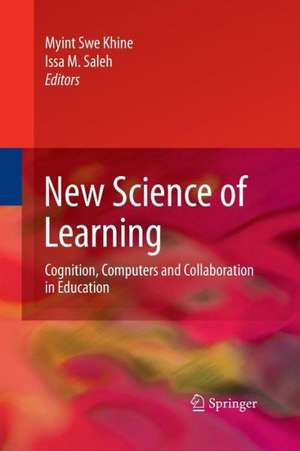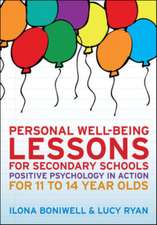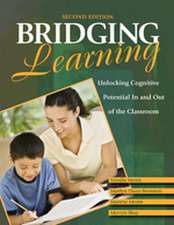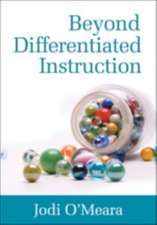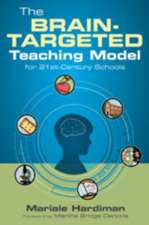New Science of Learning: Cognition, Computers and Collaboration in Education
Editat de Myint Swe Khine, Issa M. Salehen Limba Engleză Paperback – 18 sep 2014
The New Science of Learning: Cognition, Computers and Collaboration in Education deftly explores the multiple relationships found among these critical elements in students’ increasingly complex and multi-paced educational experience. Starting with instructors’ insights into the cognitive effects of digital media—a diverse range of viewpoints with little consensus—this cutting-edge resource acknowledges the double-edged potential inherent in computer-based education and its role in shaping students’ thinking capabilities. Accordingly, the emphasis is on strategies that maximize the strengths and compensate for the negative aspects of digital learning, including:
- Group cognition as a foundation for learning
- Metacognitive control of learning and remembering
- Higher education course development using open education resources
- Designing a technology-oriented teacher professional development model
- Supporting student collaboration with digital video tools
- Teaching and learning through social annotation practices
| Toate formatele și edițiile | Preț | Express |
|---|---|---|
| Paperback (1) | 961.55 lei 43-57 zile | |
| Springer – 18 sep 2014 | 961.55 lei 43-57 zile | |
| Hardback (1) | 967.22 lei 43-57 zile | |
| Springer – 13 mai 2010 | 967.22 lei 43-57 zile |
Preț: 961.55 lei
Preț vechi: 1172.62 lei
-18% Nou
Puncte Express: 1442
Preț estimativ în valută:
183.100€ • 192.59$ • 153.14£
183.100€ • 192.59$ • 153.14£
Carte tipărită la comandă
Livrare economică 31 martie-14 aprilie
Preluare comenzi: 021 569.72.76
Specificații
ISBN-13: 9781489984029
ISBN-10: 148998402X
Pagini: 644
Ilustrații: XXXIV, 607 p.
Dimensiuni: 155 x 235 x 34 mm
Greutate: 0.91 kg
Ediția:2010
Editura: Springer
Colecția Springer
Locul publicării:New York, NY, United States
ISBN-10: 148998402X
Pagini: 644
Ilustrații: XXXIV, 607 p.
Dimensiuni: 155 x 235 x 34 mm
Greutate: 0.91 kg
Ediția:2010
Editura: Springer
Colecția Springer
Locul publicării:New York, NY, United States
Public țintă
ResearchDescriere
The earliest educational software simply transferred print material from the page to the monitor. Since then, the Internet and other digital media have brought students an ever-expanding, low-cost knowledge base and the opportunity to interact with minds around the globe—while running the risk of shortening their attention spans, isolating them from interpersonal contact, and subjecting them to information overload.
The New Science of Learning: Cognition, Computers and Collaboration in Education deftly explores the multiple relationships found among these critical elements in students’ increasingly complex and multi-paced educational experience. Starting with instructors’ insights into the cognitive effects of digital media—a diverse range of viewpoints with little consensus—this cutting-edge resource acknowledges the double-edged potential inherent in computer-based education and its role in shaping students’ thinking capabilities. Accordingly, the emphasis is on strategies that maximize the strengths and compensate for the negative aspects of digital learning, including:
Endorsements:
"The book brings together leading researchers who study how technology can enhance student learning. They address questions of how technology can support collaborative learning, knowledge building, assessment, metacognition, and professional development. For example, a chapter by Howard Gardner and his colleagues describes how students are changing as they grow up with new technologies, and a chapter by Kurt W. Fischer and his colleagues describes redesigning testing with the use of latest in computer technology and learning science. Altogether it is a fine collection of chapters about the latest advances in educational technology."
Allan Collins, Northwestern University – Author, Rethinking Education in the Age of Technology
"Modern learning technologies have emerged in the 21st century as powerful tools to enhance learning and thinking, but much of their potential remains to be realized. Remarkably, as we explore how learners interact with diverse learning environments, including digital media, we are discovering that these tools also are revealing new insights into how our minds operate and how better to realize the promise that learning technologies offer. This book presents some of the latest discoveries and theoretical insights about how we think and learn, especially through explorations employing digital media. This is a first-class book containing chapters by some of the best researchers worldwide."
O. R. Anderson, Columbia University, Teachers College – Chair, Mathematics, Science and Technology
The New Science of Learning: Cognition, Computers and Collaboration in Education deftly explores the multiple relationships found among these critical elements in students’ increasingly complex and multi-paced educational experience. Starting with instructors’ insights into the cognitive effects of digital media—a diverse range of viewpoints with little consensus—this cutting-edge resource acknowledges the double-edged potential inherent in computer-based education and its role in shaping students’ thinking capabilities. Accordingly, the emphasis is on strategies that maximize the strengths and compensate for the negative aspects of digital learning, including:
- Group cognition as a foundation for learning
- Metacognitive control of learning and remembering
- Higher education course development using open education resources
- Designing a technology-oriented teacher professional development model
- Supporting student collaboration with digital video tools
- Teaching and learning through social annotation practices
Endorsements:
"The book brings together leading researchers who study how technology can enhance student learning. They address questions of how technology can support collaborative learning, knowledge building, assessment, metacognition, and professional development. For example, a chapter by Howard Gardner and his colleagues describes how students are changing as they grow up with new technologies, and a chapter by Kurt W. Fischer and his colleagues describes redesigning testing with the use of latest in computer technology and learning science. Altogether it is a fine collection of chapters about the latest advances in educational technology."
Allan Collins, Northwestern University – Author, Rethinking Education in the Age of Technology
"Modern learning technologies have emerged in the 21st century as powerful tools to enhance learning and thinking, but much of their potential remains to be realized. Remarkably, as we explore how learners interact with diverse learning environments, including digital media, we are discovering that these tools also are revealing new insights into how our minds operate and how better to realize the promise that learning technologies offer. This book presents some of the latest discoveries and theoretical insights about how we think and learn, especially through explorations employing digital media. This is a first-class book containing chapters by some of the best researchers worldwide."
O. R. Anderson, Columbia University, Teachers College – Chair, Mathematics, Science and Technology
Cuprins
ForewordRobert J. Sternberg About the Contributors PART I Cognition and New Science of Learning 1 New Digital Media and their Potential Cognitive Impact on Youth LearningMargaret Weigel, Celka Straughn, and Howard Gardner 2 Group Cognition as a Foundation for the New Science of LearningGerry Stahl 3 An Embodied/Grounded Cognition Perspective on Educational TechnologyJohn B. Black 4 Features of Computerized Multimedia Environments that Support Vicarious Learning ProcessesBarry Gholson, Roby Coles, and Scotty D. Craig 5 Human Memory and the New Science of LearningPaul Eggen 6 Metacognitive Control of Learning and RememberingJason R. Finley, Jonathan G. Tullis, and Aaron S. Benjamin 7 Ethnic Differences on Students’ Approaches to Learning: Self-regulatory Cognitive and Motivational Predictors of Academic Achievement for Latino/a and White College StudentsRobert Rueda, Hyo Jin Lim, Harold O’Neil, Noelle Griffin, Shel Bockman, &Barbara Sirotnik 8 Intuitions, Conceptions and Frameworks: Modelling Student Cognition in Science LearningKeith S. Taber 9 An Analysis of Design Strategies for Creating Educational Experiences in Virtual EnvironmentsTheresa Horstman and Stephen Kerr PART II Computers and New Science of Learning 10 Redesigning Testing: Operationalizing the New Science of Learning Zachary Stein, Theo Dawson, and Kurt W. Fischer 11 Self-Regulated Learning with MetaTutor: Advancing the Science of Learning with MetaCognitive Tools Roger Azevedo, Amy Witherspoon, Amber Chauncey, and Candice Burkett 12 New Learning -Old methods? How e-research might Change Technology-enhanced Learning ResearchPeter Reimann and Lina Markauskaite 13 Designing Higher Education Courses using Open Educational ResourcesFrank Rennie and Robin Mason 14 The Evolution of an Automated Reading Strategy Tutor: From the Classroom to a Game-Enhanced Automated System.G. Tanner Jackson, Kyle B. Dempsey, and Danielle S. McNamara 15 Experiences in the Field: The Evolution of a Technology-Oriented Teacher Professional Development ModelM. Brooke Robertshaw, Andrew Walker, Mimi Recker, Heather Leary, and Linda Sellers 16 A Dialogic Approach to Technology-enhanced Education for the Global Knowledge SocietyRupert Wegerif and Nasser Mansour 17 Conceptual Representation Embodied in Hypermedia: An Approach to Promoting Knowledge Co-constructionLei Liu and Cindy E. Hmelo-Silver 18 Virtual Worlds for Young People in a Program Context: Lessons from Four Case StudiesMarina Umaschi Bers, Laura Beals, Clement Chau, Keiko Satoh, & Nauman Khan 19 New Technologies, Learning Systems and Communication: Reducing Complexity in the Educational SystemHelle Mathiasen and Lynne Schrum PART III Collaboration and New Science of Learning 20 Fostering Higher Levels of Learning Using Diverse Instructional Strategies with Internet Communication ToolsHeather Kanuka 21 Windows into Teaching and Learning through Social Annotation PracticesHope J. Hartman 22 Orchestrating Learning in a one-to-one Technology ClassroomJitti Niramitranon, Mike Sharples, & Chris Greenhalgh 23 Designing Online Learning Environments for Professional DevelopmentKedmon Hungwe
Recenzii
Endorsements:
"The book brings together leading researchers who study how technology can enhance student learning. They address questions of how technology can support collaborative learning, knowledge building, assessment, metacognition, and professional development. For example, a chapter by Howard Gardner and his colleagues describes how students are changing as they grow up with new technologies, and a chapter by Kurt W. Fischer and his colleagues describes redesigning testing with the use of latest in computer technology and learning science. Altogether it is a fine collection of chapters about the latest advances in educational technology." (Allan Collins, Northwestern University – Author, Rethinking Education in the Age of Technology)
"Modern learning technologies have emerged in the 21st century as powerful tools to enhance learning and thinking, but much of their potential remains to be realized. Remarkably, as we explore how learners interact with diverse learning environments, including digital media, we are discovering that these tools also are revealing new insights into how our minds operate and how better to realize the promise that learning technologies offer. This book presents some of the latest discoveries and theoretical insights about how we think and learn, especially through explorations employing digital media. This is a first-class book containing chapters by some of the best researchers worldwide." (O. R. Anderson, Columbia University, Teachers College – Chair, Mathematics, Science and Technology)
"Modern learning technologies have emerged in the 21st century as powerful tools to enhance learning and thinking, but much of their potential remains to be realized. Remarkably, as we explore how learners interact with diverse learning environments, including digital media, we are discovering that these tools also are revealing new insights into how our minds operate and how better to realize the promise that learning technologies offer. This book presents some of the latest discoveries and theoretical insights about how we think and learn, especially through explorations employing digital media. This is a first-class book containing chapters by some of the best researchers worldwide." (O. R. Anderson, Columbia University, Teachers College – Chair, Mathematics, Science and Technology)
Textul de pe ultima copertă
The earliest educational software simply transferred print material from the page to the monitor. Since then, the Internet and other digital media have brought students an ever-expanding, low-cost knowledge base and the opportunity to interact with minds around the globe—while running the risk of shortening their attention spans, isolating them from interpersonal contact, and subjecting them to information overload.
The New Science of Learning: Cognition, Computers and Collaboration in Education deftly explores the multiple relationships found among these critical elements in students’ increasingly complex and multi-paced educational experience. Starting with instructors’ insights into the cognitive effects of digital media—a diverse range of viewpoints with little consensus—this cutting-edge resource acknowledges the double-edged potential inherent in computer-based education and its role in shaping students’ thinking capabilities. Accordingly, the emphasis is on strategies that maximize the strengths and compensate for the negative aspects of digital learning, including:
Endorsements:
"The book brings together leading researchers who study how technology can enhance student learning. They address questions of how technology can support collaborative learning, knowledge building, assessment, metacognition, and professional development. For example, a chapter by Howard Gardner and his colleagues describes how students are changing as they grow up with new technologies, and a chapter by Kurt W. Fischer and his colleagues describes redesigning testing with the use of latest in computer technology and learning science. Altogether it is a fine collection of chapters about the latest advances in educational technology."
Allan Collins, Northwestern University – Author, Rethinking Education in the Age of Technology
"Modern learning technologies have emerged in the 21st century as powerful tools to enhance learning and thinking, but much of their potential remains to be realized. Remarkably, as we explore how learners interact with diverse learning environments, including digital media, we are discovering that these tools also are revealing new insights into how our minds operate and how better to realize the promise that learning technologies offer. This book presents some of the latest discoveries and theoretical insights about how we think and learn, especially through explorations employing digital media. This is a first-class book containing chapters by some of the best researchers worldwide."
O. R. Anderson, Columbia University, Teachers College – Chair, Mathematics, Science and Technology
The New Science of Learning: Cognition, Computers and Collaboration in Education deftly explores the multiple relationships found among these critical elements in students’ increasingly complex and multi-paced educational experience. Starting with instructors’ insights into the cognitive effects of digital media—a diverse range of viewpoints with little consensus—this cutting-edge resource acknowledges the double-edged potential inherent in computer-based education and its role in shaping students’ thinking capabilities. Accordingly, the emphasis is on strategies that maximize the strengths and compensate for the negative aspects of digital learning, including:
- Group cognition as a foundation for learning
- Metacognitive control of learning and remembering
- Higher education course development using open education resources
- Designing a technology-oriented teacher professional development model
- Supporting student collaboration with digital video tools
- Teaching and learning through social annotation practices
Endorsements:
"The book brings together leading researchers who study how technology can enhance student learning. They address questions of how technology can support collaborative learning, knowledge building, assessment, metacognition, and professional development. For example, a chapter by Howard Gardner and his colleagues describes how students are changing as they grow up with new technologies, and a chapter by Kurt W. Fischer and his colleagues describes redesigning testing with the use of latest in computer technology and learning science. Altogether it is a fine collection of chapters about the latest advances in educational technology."
Allan Collins, Northwestern University – Author, Rethinking Education in the Age of Technology
"Modern learning technologies have emerged in the 21st century as powerful tools to enhance learning and thinking, but much of their potential remains to be realized. Remarkably, as we explore how learners interact with diverse learning environments, including digital media, we are discovering that these tools also are revealing new insights into how our minds operate and how better to realize the promise that learning technologies offer. This book presents some of the latest discoveries and theoretical insights about how we think and learn, especially through explorations employing digital media. This is a first-class book containing chapters by some of the best researchers worldwide."
O. R. Anderson, Columbia University, Teachers College – Chair, Mathematics, Science and Technology
Caracteristici
Reflects computational developments and their impacts on education
Offers a qualitatively different approach to meet the demands of twenty-first century skills
Critically examines the scientific understanding of future learning
Includes supplementary material: sn.pub/extras
Offers a qualitatively different approach to meet the demands of twenty-first century skills
Critically examines the scientific understanding of future learning
Includes supplementary material: sn.pub/extras
